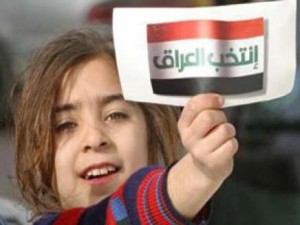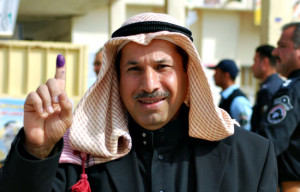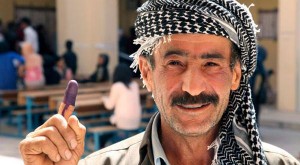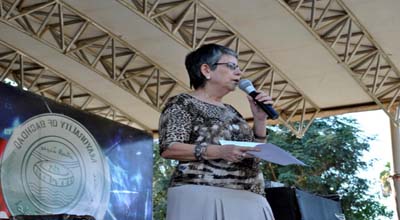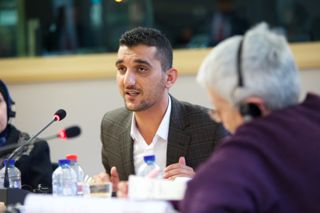Iraqi Elections in 2014, A Step Forward, Two Steps Backward!
The Iraqi Civil Society Solidarity Initiative (ICSSI) – Rome
May, 2014
From the perspective of Iraqi civil society, there is no way to deny the fact that the elections held in 2014 — the first Iraqi elections since the U.S. army withdrew from Iraq — were an accomplishment in itself and a very positive step toward the country’s rebirth. This was confirmed by representatives of civil society organizations and independent unions in Iraq, and it is what we observed in their comments in social networking sites, as well as in their formal statements. Prior to election day, fifty independent Iraqi organizations and networks issued a statement (text in Arabic) and encouraged wide participation in the elections, with hope that Iraq would find “a democratic civil political system with the values of citizenship, justice, fairness and equality”. They considered the election “a great opportunity to create a better Iraq, one that abandoned devastation, destruction, underdevelopment, terrorism and violence, and instead sought an alternative to the failed administration of the country during the past eight years. This would put greater emphasis on some key issues, for instance, on security and stability, and a concerted attempt to provide basic services to the citizens, on the possibility of development and reconstruction, and the return of civil, political, cultural and economic liberties”.
Of course it is too early to know to which extent the Iraqi elections will achieve the changes demanded by civil society, but it is agreed that change is possible, even if it is a modest one. Furthermore, it now widely agreed by Iraqi civil society that violence is simply not an option, and real change must come through organization, a constructive programme, networking, advocacy and the great power of collective action, including the possibility of non-violent protest as a first option and last resort.
If holding these elections was a success and a step forward, the question then is: what might be the inevitable steps backwards? From the perspective of civil society, these backward steps are found in the overall electoral process, in the performance of Iraqi institutions, and in the Independent Electoral Commission. They can be summarizes in two points:
Prior to the elections, the Electoral Commission took decisions that were described as arbitrary, and against organizations and certain candidates running for office. The Commission decided not to accept the election monitoring network known as “Shams Network” in the current elections because this network had identified doubts in the electronic voting system and in some of the Commission’s procedures. The Commission even filed a lawsuit against the network coordinator and launched a media war on the network itself. This sets a bad precedent, for it deprives civil organizations of their right to criticize the Commission’s procedures. It would have been better to have an open and public dialogue, where criticisms could be leveled, and the positions of both sides articulated and defended. This would set an example, not of exclusion and repression of dissent, but of free and open discussion and debate, in which all participants have a voice. As it stands, the fear is that the Electoral Commission will turn this case into a kind of precedent in which it can simply exclude anyone who criticizes its performance.
The Electoral Commission also excluded candidates from the elections, some because of the continued application of De-Ba’athification policies, bringing the number of those excluded from one list (the National list) to 39 candidates. Others were excluded because of lawsuits filed against them, often related to freedom of expression, and more specifically when ‘expressing’ criticisms against the Iraqi government or its members. Some of them managed to overturn these decisions, but they were often discredited or subjected to personal threat. This damage is permanent. It would be more just to exclude only those who are found guilty in a final judgment by the Iraqi judiciary. Unfortunately, it appears that the standards that apply to Iraqi candidates depend more or less on their positions towards the current government. It is very worrisome if those who are close to the government have a greater chance of participating in the elections.
The clergy towed the same line in this election as it did with past elections: some acted very negatively, e.g. prohibiting believers to vote, outright. This was the case with the Sunni cleric (Al-Saadi): as a man who is revered and respected by a wide range of Iraqis, his call to Sunnis to boycott the election was quite powerful. We also found that certain election lists were systematically targeted. For instance, the Shiite cleric (Al-Haeri) released a Fatwa forbidding the election of secular candidates, and the religious Iraqi Shiite cleric (Bashir Al-Najafi) forbade supporting candidates on the Prime Minister’s list.
The Electoral Commission and Iraqi political parties are virtually powerless to prevent the clergy from interfering with or prejudicing the election process, despite the great risks associated with such intervention. Banning the elections outright, or forbidding the election of specific candidates – in a situation such as the Iraq one – may mean subjecting some voters and candidates to serious risks, including killing or kidnapping by armed groups and militias. A number of other clergy from different religions and doctrines issued positive statements, encouraging participation in the election, while at the same time acknowledging that they themselves stood at the same distance from all the candidates. Although this latter type make up the majority of the clergy, the negative impact of the former remains substantial.
The other step back can be found in the continued exploitation by certain candidates of public money in election campaigns. There is a video that highlights one candidate of the Iraqi Prime Minister’s list who appears on tape distributing pieces of land to poor Iraqis. This spread through social media very quickly, showing the extent of the blatant manipulation of the poor through the exploitation of public money — and there were no consequences. The inability of the Electoral Commission to exclude this candidate and those who supported him is further evidence of the inability of this Commission to act on clear and indisputable evidence of a case of manipulation of public money.
Of course the independence of the Iraqi Electoral Commission has now been called into question within Iraq, it is an unfortunate fact that we need now to reckon with.
That said, the Commission or the Commissioners do not alone bear the responsibility of compromising this independence. The matter is much more far-reaching. Iraqi political forces intentionally chose a Board of Commissioners in a sectarian manner, and therefore some members of the Commission and its officials acted in a way that is supportive of those who stood behind their nomination and their access to positions in the government. The Iraqi government and the powerful parties are seen to be some of the most influential political actors on the Electoral Commission (especially the list of the State of Law Coalition), operating through tactics of intimidation and other times by offering benefits. All political forces bear responsibility of the continuous ablation policy that is applied selectively in favor of the dominant forces in Iraq today.
——-
To follow the news of the Iraqi Civil Society Solidarity Initiative through social networking pages, be friends of the initiative through this profile page: https://www.facebook.com/solidarityinitiative.icssi
Or follow one of the pages associated with the initiative campaigns:
To send information or write notes, write to the following email address: icssi.project@gmail.com


